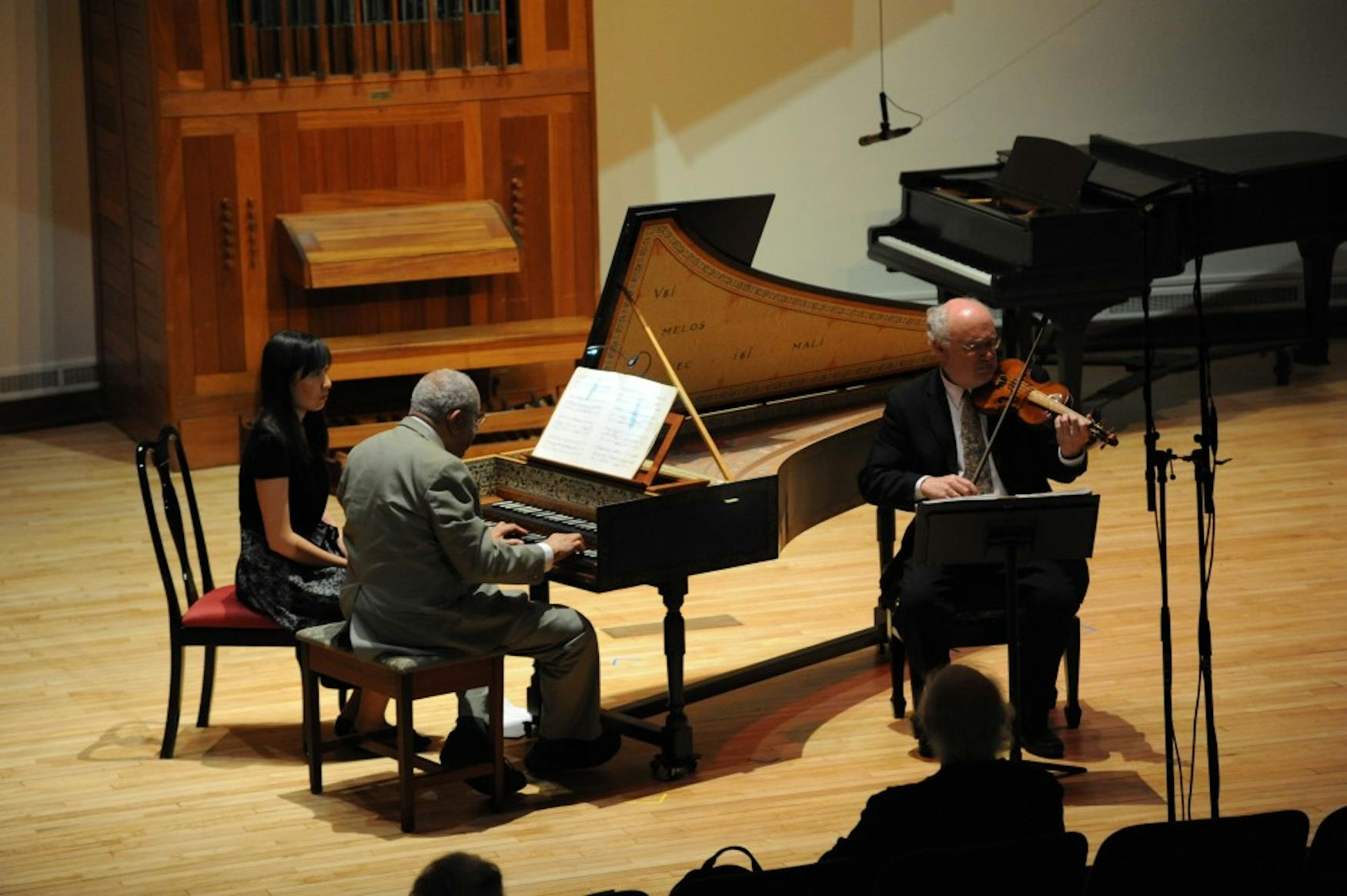Late music prof honored at concert
A large crowd flocked to Slosberg Music Center on Sunday evening to honor the late Erwin Bodky, the first professor of music at Brandeis. An erudite teacher, composer, pianist and musicologist, this concert featured mostly his own compositions, interspersed with speaches about his work as a teacher and a lecture about his life. Spurred by an interest in the late professor’s compositions, Prof. Daniel Stepner (MUS) set forth the idea for this concert, inviting pianist and fellow faculty member Prof. Evan Hirsch (MUS) to join him in performing this long forgotten work.
Stepner, a violinist, took the stage first, performing Bach’s “Sonata in A major, BMW 1015,” accompanied on the harpsichord by James Nicolson, the president of the Cambridge Society of Early Music. This apt programming choice honored Bodky’s musicological and performance work. His most widely known publication, “Der Vortrag alter Klaviermusik” (“The Performance of early Keyboard Music”) explored and explained contemporary performance practice for among other earlier composers, Johann Sebastian Bach, the Baroque period’s most innovative and celebrated composer.
Stepner’s musical voice spoke remarkably clearly, effortlessly navigating the intimate spaces of sound around the bright and fast-decaying notes on the harpsichord. His softness, attention and seasoned ease brought life to the genius of Bach’s melodic counterpoint. There were occasional moments of discomfort in the unity between Stepner and Nicolson, but nonetheless, the audience witnessed a careful and compassionate rendition of the piece.
After they finished, Nicolson addressed the audience about his relation to Bodky and how the late Brandeis professor inspired local musicians to form a society for the revival of music from the Baroque period and earlier periods. As the current president of the still existent organization, Nicolson attested to the continuation of Bodky’s legacy as an ambassador and advocate of music predating the Classical period.
For the following selection, Hirsch, on the piano, performed “Variations on an Old German Song,” a piece that was composed by Bodky himself. Though distinguished enough to become one of only three students accepted by famed German composer Richard Strauss, Bodky gave up composing as a young adult. Going on to become a celebrated performer and professor of music in Berlin, he immigrated to the United States in the late 1930s; his Brandeis students and even most of his family members never knew of his prior aspirations as a composer. In addressing the audience, Hirsch recognized that although he has premiered many works by living composers, this counts as the first premier of a piece by a long deceased composer: a unique opportunity.
Seated at the piano, Hirsch commanded the stage with his gentle demeanor as he presented the composition. Through the course of this 10 to 15 minute piece, the theme took on many different lives—the first a gentle, homophonic chorale texture. A few minutes in, it expanded to a feeling of anguish, realized by rising scales of octaves in the right hand. Many times, this piece came to a full halt, before shooting into a radically altered incarnation of the main theme. The last realization of the theme clearly broadcasted the ending of the piece: a relentless forceful explanation of the theme, the thickly voiced chords that were almost pounded out. The virtuosic piece sounded like a work of his time, with implicit hints of Brahms’ and Rachmaninoff’s theme-variations.
Next mezzo-soprano Deborah Rentz-Moore joined Hirsch for three songs.
During one of the breaks for anecdotes between pieces, a former student remarked on the disconnect between the man they knew and the sort of darkness explored in his music. My favorite of these three songs depicted depression, as a bird, friendly and obedient to death. He artistically explained the text through uttered and re-uttered pained gestures in the piano, and by radically altering the pacing of the words.
A wonderful professor, Bodky made a lasting impression on his students. After the intermission, Nancy Golden ’54, Brandeis’ first graduating music major attested to this. Though the program was in its infancy, she benefitted from working closely with this, as she described, congenial and warm-hearted teacher. She often went to his house for lunch, eating traditional German food prepared by his wife.
The last piece, Bodky’s “Spring Round-dance of the Dysentery Bug” showcased Bodky’s sense of humor: in the music and via its title. Hirsch comfortably accompanied Stepner, who moved gracefully in boldly exclaiming the theme material of this nostalgic, yet still energetic waltz.
Despite Stepner’s acknowledging that Bodky’s music was “very current with musical trends of his time,” his music felt remarkably separate from the avant-garde—especially for the time when Modernism was first starting to spread its wings in Classical music. Nonetheless, these delightful and coherent works by a literate and skilled musician made for a wonderful concert.



Please note All comments are eligible for publication in The Justice.